Complex Care Management: A Case Study of John Smith's Lung Cancer
VerifiedAdded on 2023/06/18
|7
|1953
|382
Case Study
AI Summary
This case study examines the complex care required for John Smith, a patient suffering from lung cancer with bone and liver metastases, transitioning from acute care to home. The analysis focuses on managing physical symptoms like fatigue, chest infection, back pain, and abdominal pain, as well as addressing psychological symptoms such as anxiety. The study explores pharmacological and non-pharmacological interventions, including medication, rehabilitation strategies, and music therapy, to improve John's overall well-being. It also discusses the importance of research in enhancing quality medical services and addressing issues like costly treatments. The case emphasizes the need for a holistic approach, integrating medical expertise, nursing care, and emotional support to optimize patient recovery and improve their quality of life. Desklib offers a range of resources, including solved assignments and past papers, to aid students in understanding complex healthcare scenarios.
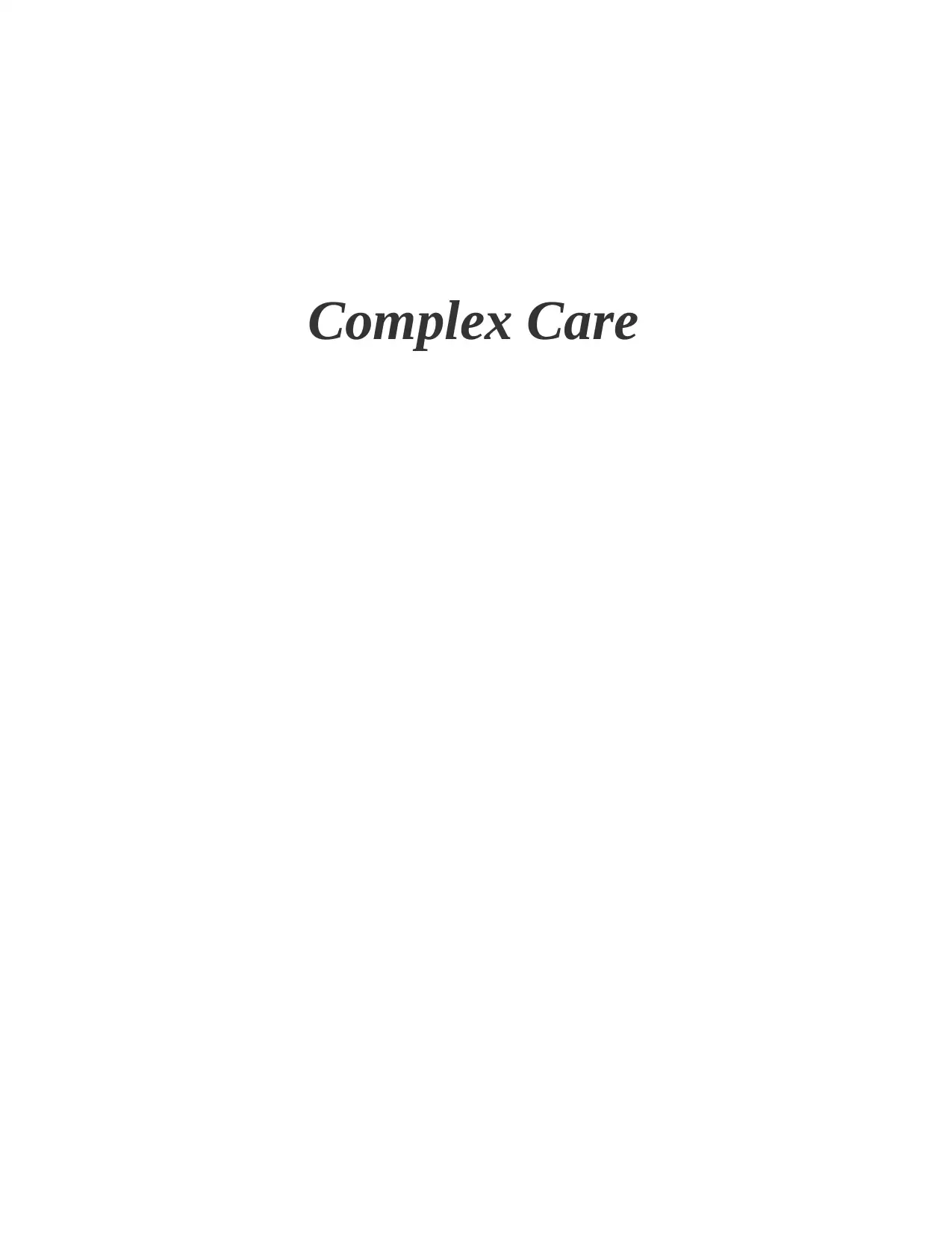
Complex Care
Paraphrase This Document
Need a fresh take? Get an instant paraphrase of this document with our AI Paraphraser
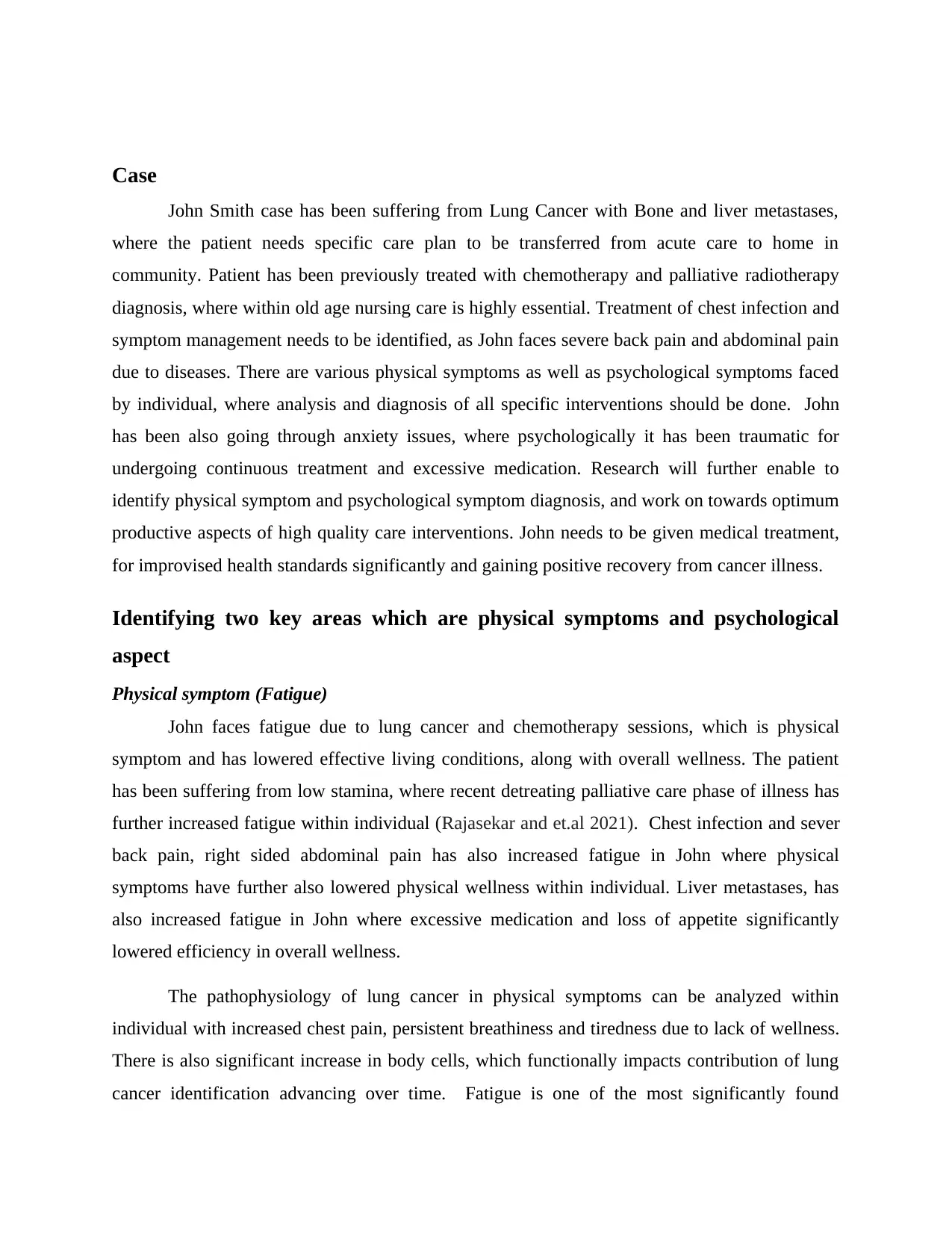
Case
John Smith case has been suffering from Lung Cancer with Bone and liver metastases,
where the patient needs specific care plan to be transferred from acute care to home in
community. Patient has been previously treated with chemotherapy and palliative radiotherapy
diagnosis, where within old age nursing care is highly essential. Treatment of chest infection and
symptom management needs to be identified, as John faces severe back pain and abdominal pain
due to diseases. There are various physical symptoms as well as psychological symptoms faced
by individual, where analysis and diagnosis of all specific interventions should be done. John
has been also going through anxiety issues, where psychologically it has been traumatic for
undergoing continuous treatment and excessive medication. Research will further enable to
identify physical symptom and psychological symptom diagnosis, and work on towards optimum
productive aspects of high quality care interventions. John needs to be given medical treatment,
for improvised health standards significantly and gaining positive recovery from cancer illness.
Identifying two key areas which are physical symptoms and psychological
aspect
Physical symptom (Fatigue)
John faces fatigue due to lung cancer and chemotherapy sessions, which is physical
symptom and has lowered effective living conditions, along with overall wellness. The patient
has been suffering from low stamina, where recent detreating palliative care phase of illness has
further increased fatigue within individual (Rajasekar and et.al 2021). Chest infection and sever
back pain, right sided abdominal pain has also increased fatigue in John where physical
symptoms have further also lowered physical wellness within individual. Liver metastases, has
also increased fatigue in John where excessive medication and loss of appetite significantly
lowered efficiency in overall wellness.
The pathophysiology of lung cancer in physical symptoms can be analyzed within
individual with increased chest pain, persistent breathiness and tiredness due to lack of wellness.
There is also significant increase in body cells, which functionally impacts contribution of lung
cancer identification advancing over time. Fatigue is one of the most significantly found
John Smith case has been suffering from Lung Cancer with Bone and liver metastases,
where the patient needs specific care plan to be transferred from acute care to home in
community. Patient has been previously treated with chemotherapy and palliative radiotherapy
diagnosis, where within old age nursing care is highly essential. Treatment of chest infection and
symptom management needs to be identified, as John faces severe back pain and abdominal pain
due to diseases. There are various physical symptoms as well as psychological symptoms faced
by individual, where analysis and diagnosis of all specific interventions should be done. John
has been also going through anxiety issues, where psychologically it has been traumatic for
undergoing continuous treatment and excessive medication. Research will further enable to
identify physical symptom and psychological symptom diagnosis, and work on towards optimum
productive aspects of high quality care interventions. John needs to be given medical treatment,
for improvised health standards significantly and gaining positive recovery from cancer illness.
Identifying two key areas which are physical symptoms and psychological
aspect
Physical symptom (Fatigue)
John faces fatigue due to lung cancer and chemotherapy sessions, which is physical
symptom and has lowered effective living conditions, along with overall wellness. The patient
has been suffering from low stamina, where recent detreating palliative care phase of illness has
further increased fatigue within individual (Rajasekar and et.al 2021). Chest infection and sever
back pain, right sided abdominal pain has also increased fatigue in John where physical
symptoms have further also lowered physical wellness within individual. Liver metastases, has
also increased fatigue in John where excessive medication and loss of appetite significantly
lowered efficiency in overall wellness.
The pathophysiology of lung cancer in physical symptoms can be analyzed within
individual with increased chest pain, persistent breathiness and tiredness due to lack of wellness.
There is also significant increase in body cells, which functionally impacts contribution of lung
cancer identification advancing over time. Fatigue is one of the most significantly found
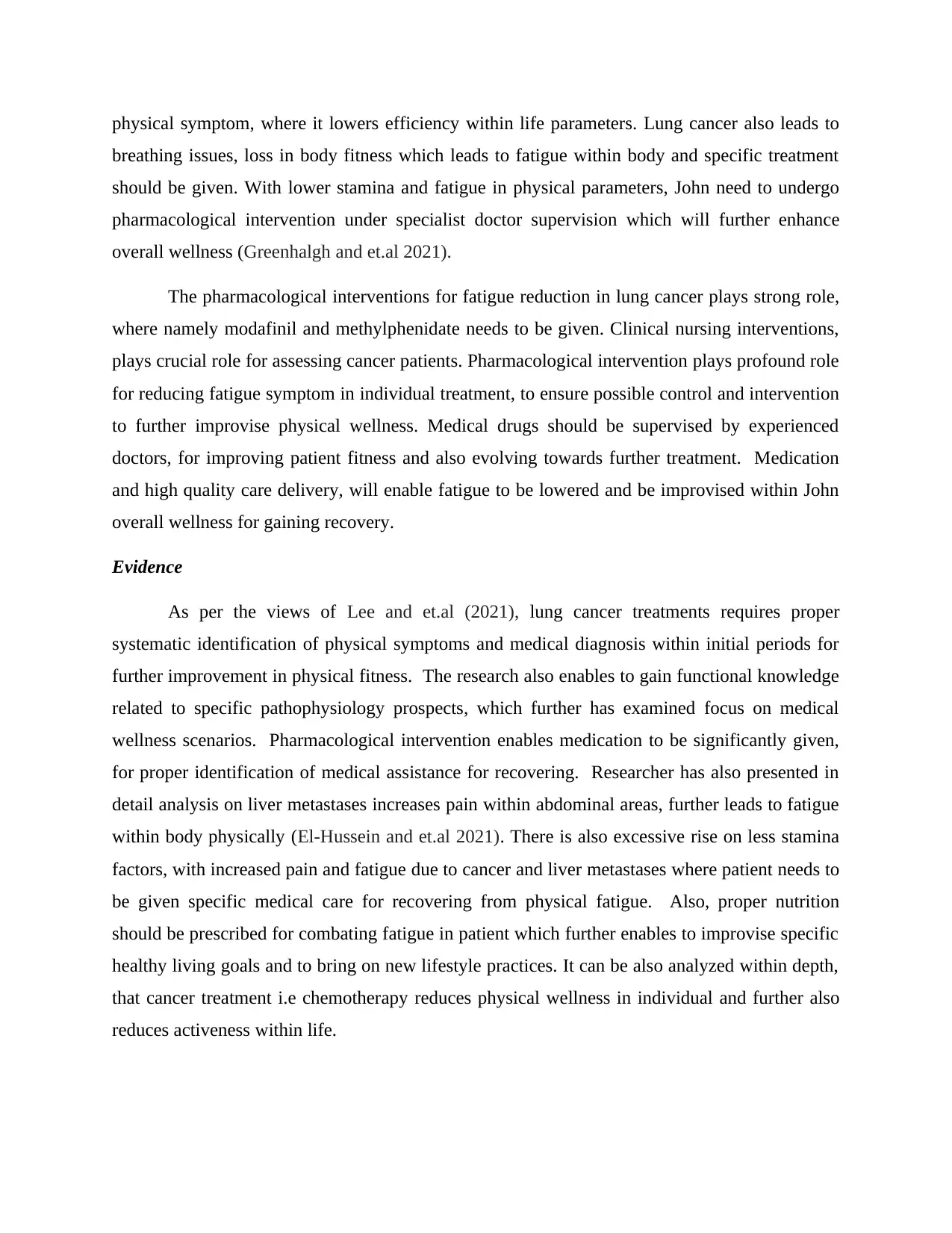
physical symptom, where it lowers efficiency within life parameters. Lung cancer also leads to
breathing issues, loss in body fitness which leads to fatigue within body and specific treatment
should be given. With lower stamina and fatigue in physical parameters, John need to undergo
pharmacological intervention under specialist doctor supervision which will further enhance
overall wellness (Greenhalgh and et.al 2021).
The pharmacological interventions for fatigue reduction in lung cancer plays strong role,
where namely modafinil and methylphenidate needs to be given. Clinical nursing interventions,
plays crucial role for assessing cancer patients. Pharmacological intervention plays profound role
for reducing fatigue symptom in individual treatment, to ensure possible control and intervention
to further improvise physical wellness. Medical drugs should be supervised by experienced
doctors, for improving patient fitness and also evolving towards further treatment. Medication
and high quality care delivery, will enable fatigue to be lowered and be improvised within John
overall wellness for gaining recovery.
Evidence
As per the views of Lee and et.al (2021), lung cancer treatments requires proper
systematic identification of physical symptoms and medical diagnosis within initial periods for
further improvement in physical fitness. The research also enables to gain functional knowledge
related to specific pathophysiology prospects, which further has examined focus on medical
wellness scenarios. Pharmacological intervention enables medication to be significantly given,
for proper identification of medical assistance for recovering. Researcher has also presented in
detail analysis on liver metastases increases pain within abdominal areas, further leads to fatigue
within body physically (El-Hussein and et.al 2021). There is also excessive rise on less stamina
factors, with increased pain and fatigue due to cancer and liver metastases where patient needs to
be given specific medical care for recovering from physical fatigue. Also, proper nutrition
should be prescribed for combating fatigue in patient which further enables to improvise specific
healthy living goals and to bring on new lifestyle practices. It can be also analyzed within depth,
that cancer treatment i.e chemotherapy reduces physical wellness in individual and further also
reduces activeness within life.
breathing issues, loss in body fitness which leads to fatigue within body and specific treatment
should be given. With lower stamina and fatigue in physical parameters, John need to undergo
pharmacological intervention under specialist doctor supervision which will further enhance
overall wellness (Greenhalgh and et.al 2021).
The pharmacological interventions for fatigue reduction in lung cancer plays strong role,
where namely modafinil and methylphenidate needs to be given. Clinical nursing interventions,
plays crucial role for assessing cancer patients. Pharmacological intervention plays profound role
for reducing fatigue symptom in individual treatment, to ensure possible control and intervention
to further improvise physical wellness. Medical drugs should be supervised by experienced
doctors, for improving patient fitness and also evolving towards further treatment. Medication
and high quality care delivery, will enable fatigue to be lowered and be improvised within John
overall wellness for gaining recovery.
Evidence
As per the views of Lee and et.al (2021), lung cancer treatments requires proper
systematic identification of physical symptoms and medical diagnosis within initial periods for
further improvement in physical fitness. The research also enables to gain functional knowledge
related to specific pathophysiology prospects, which further has examined focus on medical
wellness scenarios. Pharmacological intervention enables medication to be significantly given,
for proper identification of medical assistance for recovering. Researcher has also presented in
detail analysis on liver metastases increases pain within abdominal areas, further leads to fatigue
within body physically (El-Hussein and et.al 2021). There is also excessive rise on less stamina
factors, with increased pain and fatigue due to cancer and liver metastases where patient needs to
be given specific medical care for recovering from physical fatigue. Also, proper nutrition
should be prescribed for combating fatigue in patient which further enables to improvise specific
healthy living goals and to bring on new lifestyle practices. It can be also analyzed within depth,
that cancer treatment i.e chemotherapy reduces physical wellness in individual and further also
reduces activeness within life.
⊘ This is a preview!⊘
Do you want full access?
Subscribe today to unlock all pages.

Trusted by 1+ million students worldwide
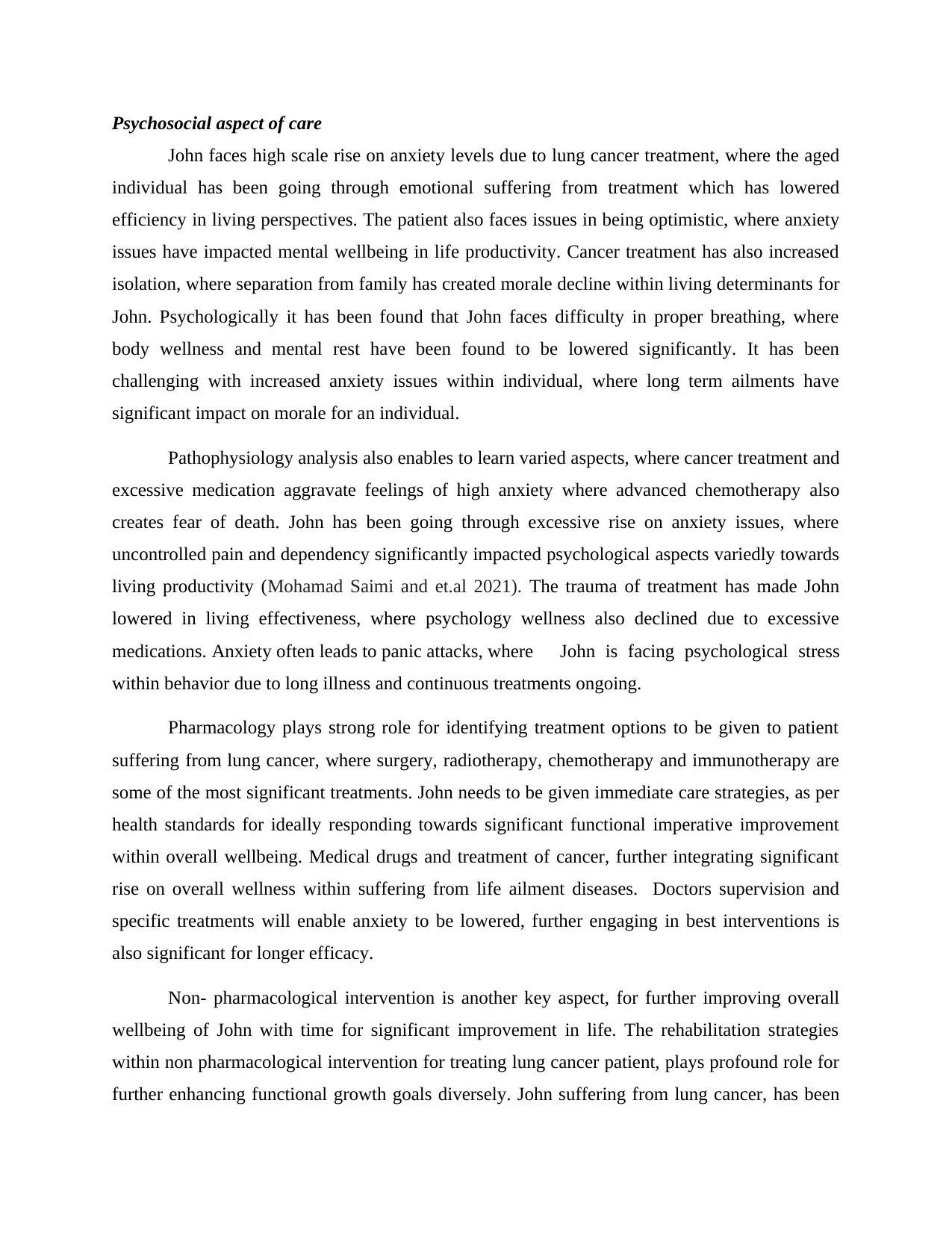
Psychosocial aspect of care
John faces high scale rise on anxiety levels due to lung cancer treatment, where the aged
individual has been going through emotional suffering from treatment which has lowered
efficiency in living perspectives. The patient also faces issues in being optimistic, where anxiety
issues have impacted mental wellbeing in life productivity. Cancer treatment has also increased
isolation, where separation from family has created morale decline within living determinants for
John. Psychologically it has been found that John faces difficulty in proper breathing, where
body wellness and mental rest have been found to be lowered significantly. It has been
challenging with increased anxiety issues within individual, where long term ailments have
significant impact on morale for an individual.
Pathophysiology analysis also enables to learn varied aspects, where cancer treatment and
excessive medication aggravate feelings of high anxiety where advanced chemotherapy also
creates fear of death. John has been going through excessive rise on anxiety issues, where
uncontrolled pain and dependency significantly impacted psychological aspects variedly towards
living productivity (Mohamad Saimi and et.al 2021). The trauma of treatment has made John
lowered in living effectiveness, where psychology wellness also declined due to excessive
medications. Anxiety often leads to panic attacks, where John is facing psychological stress
within behavior due to long illness and continuous treatments ongoing.
Pharmacology plays strong role for identifying treatment options to be given to patient
suffering from lung cancer, where surgery, radiotherapy, chemotherapy and immunotherapy are
some of the most significant treatments. John needs to be given immediate care strategies, as per
health standards for ideally responding towards significant functional imperative improvement
within overall wellbeing. Medical drugs and treatment of cancer, further integrating significant
rise on overall wellness within suffering from life ailment diseases. Doctors supervision and
specific treatments will enable anxiety to be lowered, further engaging in best interventions is
also significant for longer efficacy.
Non- pharmacological intervention is another key aspect, for further improving overall
wellbeing of John with time for significant improvement in life. The rehabilitation strategies
within non pharmacological intervention for treating lung cancer patient, plays profound role for
further enhancing functional growth goals diversely. John suffering from lung cancer, has been
John faces high scale rise on anxiety levels due to lung cancer treatment, where the aged
individual has been going through emotional suffering from treatment which has lowered
efficiency in living perspectives. The patient also faces issues in being optimistic, where anxiety
issues have impacted mental wellbeing in life productivity. Cancer treatment has also increased
isolation, where separation from family has created morale decline within living determinants for
John. Psychologically it has been found that John faces difficulty in proper breathing, where
body wellness and mental rest have been found to be lowered significantly. It has been
challenging with increased anxiety issues within individual, where long term ailments have
significant impact on morale for an individual.
Pathophysiology analysis also enables to learn varied aspects, where cancer treatment and
excessive medication aggravate feelings of high anxiety where advanced chemotherapy also
creates fear of death. John has been going through excessive rise on anxiety issues, where
uncontrolled pain and dependency significantly impacted psychological aspects variedly towards
living productivity (Mohamad Saimi and et.al 2021). The trauma of treatment has made John
lowered in living effectiveness, where psychology wellness also declined due to excessive
medications. Anxiety often leads to panic attacks, where John is facing psychological stress
within behavior due to long illness and continuous treatments ongoing.
Pharmacology plays strong role for identifying treatment options to be given to patient
suffering from lung cancer, where surgery, radiotherapy, chemotherapy and immunotherapy are
some of the most significant treatments. John needs to be given immediate care strategies, as per
health standards for ideally responding towards significant functional imperative improvement
within overall wellbeing. Medical drugs and treatment of cancer, further integrating significant
rise on overall wellness within suffering from life ailment diseases. Doctors supervision and
specific treatments will enable anxiety to be lowered, further engaging in best interventions is
also significant for longer efficacy.
Non- pharmacological intervention is another key aspect, for further improving overall
wellbeing of John with time for significant improvement in life. The rehabilitation strategies
within non pharmacological intervention for treating lung cancer patient, plays profound role for
further enhancing functional growth goals diversely. John suffering from lung cancer, has been
Paraphrase This Document
Need a fresh take? Get an instant paraphrase of this document with our AI Paraphraser
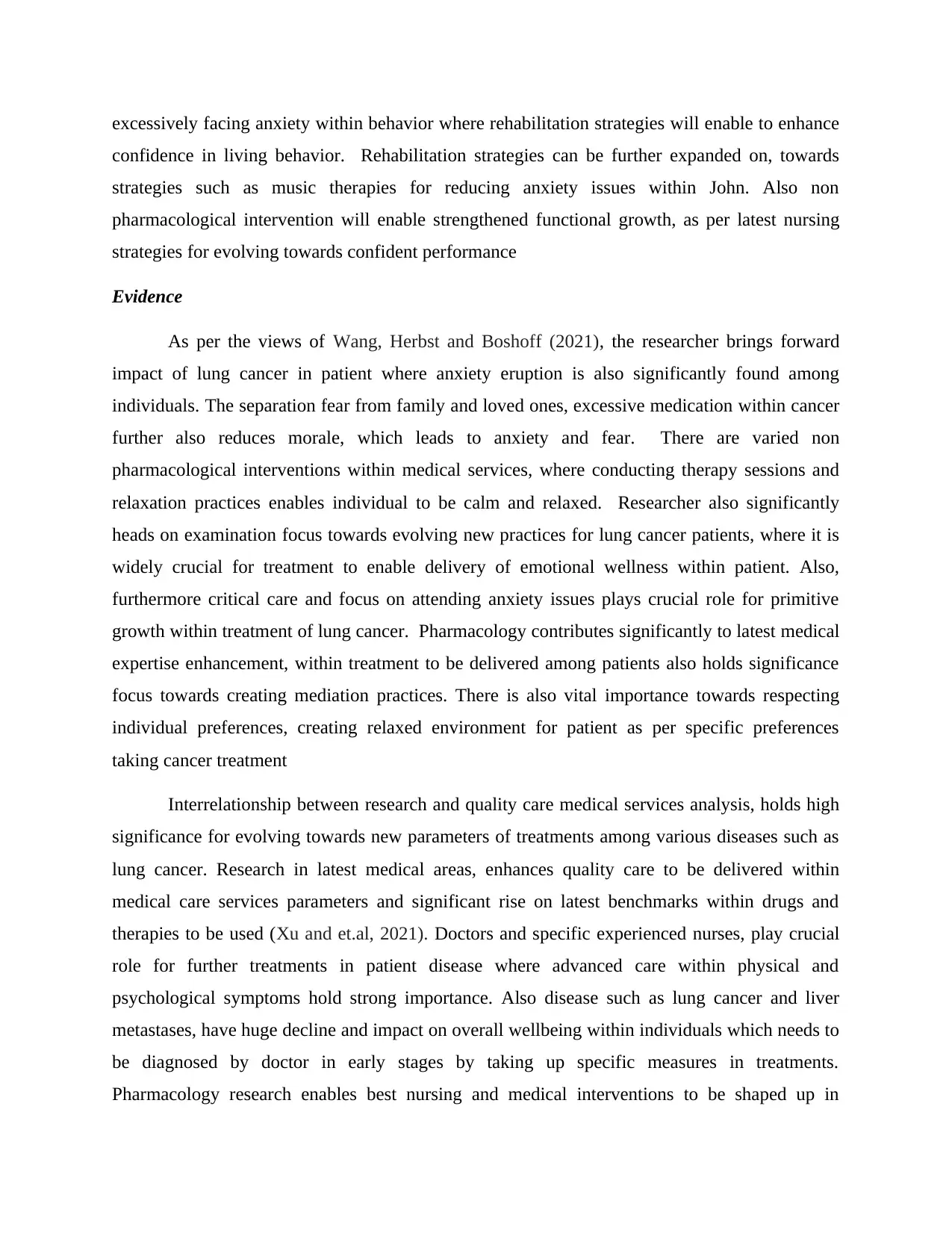
excessively facing anxiety within behavior where rehabilitation strategies will enable to enhance
confidence in living behavior. Rehabilitation strategies can be further expanded on, towards
strategies such as music therapies for reducing anxiety issues within John. Also non
pharmacological intervention will enable strengthened functional growth, as per latest nursing
strategies for evolving towards confident performance
Evidence
As per the views of Wang, Herbst and Boshoff (2021), the researcher brings forward
impact of lung cancer in patient where anxiety eruption is also significantly found among
individuals. The separation fear from family and loved ones, excessive medication within cancer
further also reduces morale, which leads to anxiety and fear. There are varied non
pharmacological interventions within medical services, where conducting therapy sessions and
relaxation practices enables individual to be calm and relaxed. Researcher also significantly
heads on examination focus towards evolving new practices for lung cancer patients, where it is
widely crucial for treatment to enable delivery of emotional wellness within patient. Also,
furthermore critical care and focus on attending anxiety issues plays crucial role for primitive
growth within treatment of lung cancer. Pharmacology contributes significantly to latest medical
expertise enhancement, within treatment to be delivered among patients also holds significance
focus towards creating mediation practices. There is also vital importance towards respecting
individual preferences, creating relaxed environment for patient as per specific preferences
taking cancer treatment
Interrelationship between research and quality care medical services analysis, holds high
significance for evolving towards new parameters of treatments among various diseases such as
lung cancer. Research in latest medical areas, enhances quality care to be delivered within
medical care services parameters and significant rise on latest benchmarks within drugs and
therapies to be used (Xu and et.al, 2021). Doctors and specific experienced nurses, play crucial
role for further treatments in patient disease where advanced care within physical and
psychological symptoms hold strong importance. Also disease such as lung cancer and liver
metastases, have huge decline and impact on overall wellbeing within individuals which needs to
be diagnosed by doctor in early stages by taking up specific measures in treatments.
Pharmacology research enables best nursing and medical interventions to be shaped up in
confidence in living behavior. Rehabilitation strategies can be further expanded on, towards
strategies such as music therapies for reducing anxiety issues within John. Also non
pharmacological intervention will enable strengthened functional growth, as per latest nursing
strategies for evolving towards confident performance
Evidence
As per the views of Wang, Herbst and Boshoff (2021), the researcher brings forward
impact of lung cancer in patient where anxiety eruption is also significantly found among
individuals. The separation fear from family and loved ones, excessive medication within cancer
further also reduces morale, which leads to anxiety and fear. There are varied non
pharmacological interventions within medical services, where conducting therapy sessions and
relaxation practices enables individual to be calm and relaxed. Researcher also significantly
heads on examination focus towards evolving new practices for lung cancer patients, where it is
widely crucial for treatment to enable delivery of emotional wellness within patient. Also,
furthermore critical care and focus on attending anxiety issues plays crucial role for primitive
growth within treatment of lung cancer. Pharmacology contributes significantly to latest medical
expertise enhancement, within treatment to be delivered among patients also holds significance
focus towards creating mediation practices. There is also vital importance towards respecting
individual preferences, creating relaxed environment for patient as per specific preferences
taking cancer treatment
Interrelationship between research and quality care medical services analysis, holds high
significance for evolving towards new parameters of treatments among various diseases such as
lung cancer. Research in latest medical areas, enhances quality care to be delivered within
medical care services parameters and significant rise on latest benchmarks within drugs and
therapies to be used (Xu and et.al, 2021). Doctors and specific experienced nurses, play crucial
role for further treatments in patient disease where advanced care within physical and
psychological symptoms hold strong importance. Also disease such as lung cancer and liver
metastases, have huge decline and impact on overall wellbeing within individuals which needs to
be diagnosed by doctor in early stages by taking up specific measures in treatments.
Pharmacology research enables best nursing and medical interventions to be shaped up in
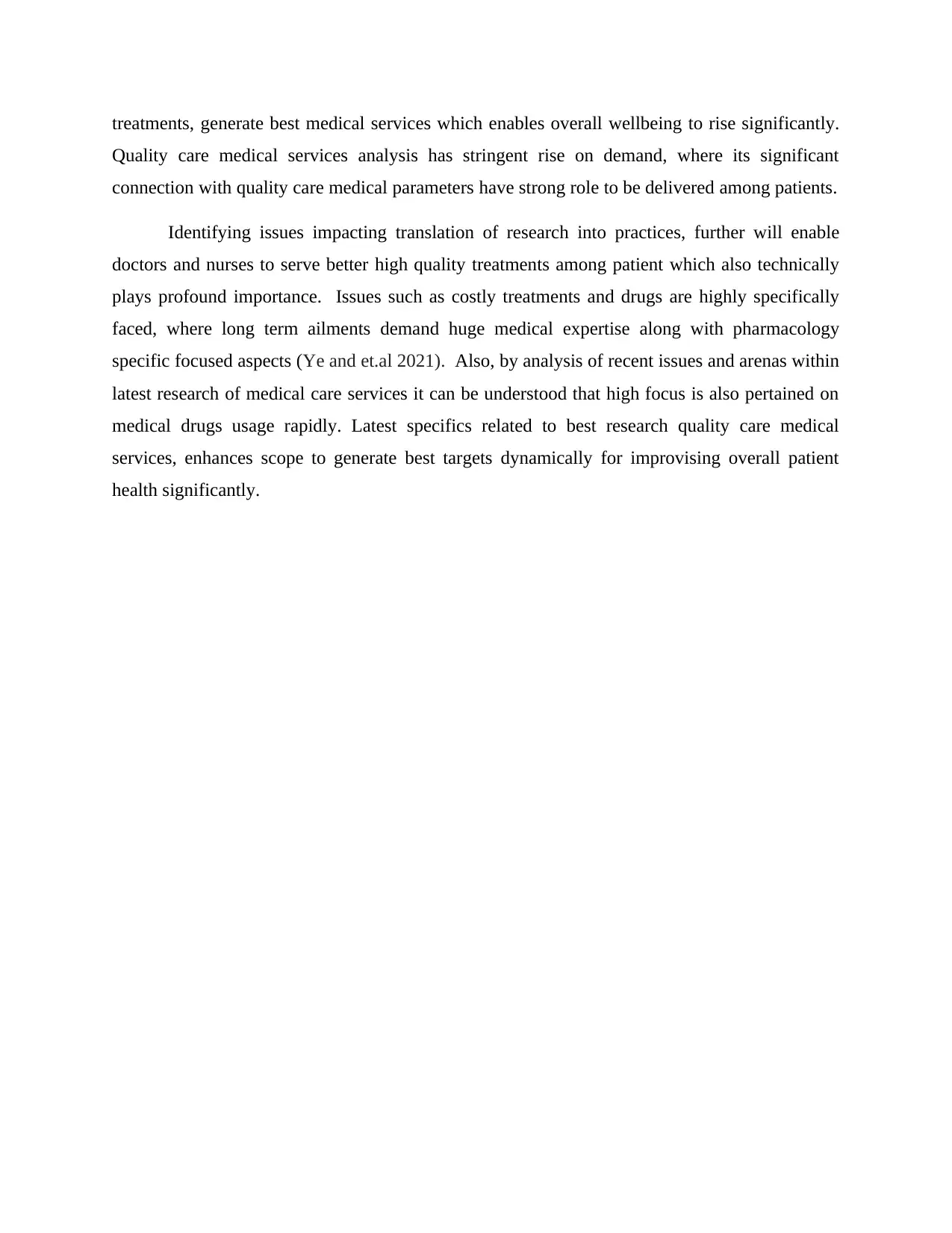
treatments, generate best medical services which enables overall wellbeing to rise significantly.
Quality care medical services analysis has stringent rise on demand, where its significant
connection with quality care medical parameters have strong role to be delivered among patients.
Identifying issues impacting translation of research into practices, further will enable
doctors and nurses to serve better high quality treatments among patient which also technically
plays profound importance. Issues such as costly treatments and drugs are highly specifically
faced, where long term ailments demand huge medical expertise along with pharmacology
specific focused aspects (Ye and et.al 2021). Also, by analysis of recent issues and arenas within
latest research of medical care services it can be understood that high focus is also pertained on
medical drugs usage rapidly. Latest specifics related to best research quality care medical
services, enhances scope to generate best targets dynamically for improvising overall patient
health significantly.
Quality care medical services analysis has stringent rise on demand, where its significant
connection with quality care medical parameters have strong role to be delivered among patients.
Identifying issues impacting translation of research into practices, further will enable
doctors and nurses to serve better high quality treatments among patient which also technically
plays profound importance. Issues such as costly treatments and drugs are highly specifically
faced, where long term ailments demand huge medical expertise along with pharmacology
specific focused aspects (Ye and et.al 2021). Also, by analysis of recent issues and arenas within
latest research of medical care services it can be understood that high focus is also pertained on
medical drugs usage rapidly. Latest specifics related to best research quality care medical
services, enhances scope to generate best targets dynamically for improvising overall patient
health significantly.
⊘ This is a preview!⊘
Do you want full access?
Subscribe today to unlock all pages.

Trusted by 1+ million students worldwide
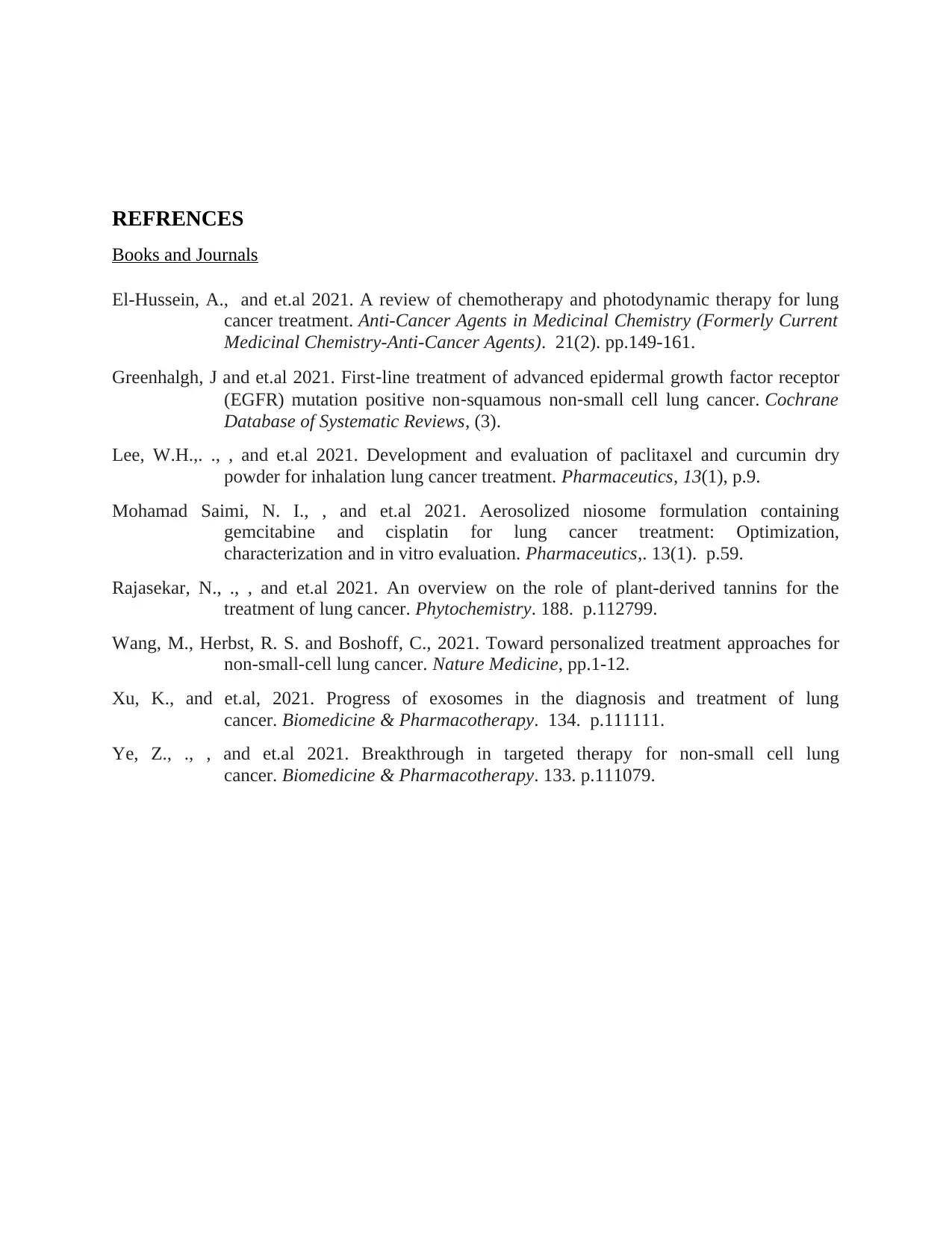
REFRENCES
Books and Journals
El-Hussein, A., and et.al 2021. A review of chemotherapy and photodynamic therapy for lung
cancer treatment. Anti-Cancer Agents in Medicinal Chemistry (Formerly Current
Medicinal Chemistry-Anti-Cancer Agents). 21(2). pp.149-161.
Greenhalgh, J and et.al 2021. First‐line treatment of advanced epidermal growth factor receptor
(EGFR) mutation positive non‐squamous non‐small cell lung cancer. Cochrane
Database of Systematic Reviews, (3).
Lee, W.H.,. ., , and et.al 2021. Development and evaluation of paclitaxel and curcumin dry
powder for inhalation lung cancer treatment. Pharmaceutics, 13(1), p.9.
Mohamad Saimi, N. I., , and et.al 2021. Aerosolized niosome formulation containing
gemcitabine and cisplatin for lung cancer treatment: Optimization,
characterization and in vitro evaluation. Pharmaceutics,. 13(1). p.59.
Rajasekar, N., ., , and et.al 2021. An overview on the role of plant-derived tannins for the
treatment of lung cancer. Phytochemistry. 188. p.112799.
Wang, M., Herbst, R. S. and Boshoff, C., 2021. Toward personalized treatment approaches for
non-small-cell lung cancer. Nature Medicine, pp.1-12.
Xu, K., and et.al, 2021. Progress of exosomes in the diagnosis and treatment of lung
cancer. Biomedicine & Pharmacotherapy. 134. p.111111.
Ye, Z., ., , and et.al 2021. Breakthrough in targeted therapy for non-small cell lung
cancer. Biomedicine & Pharmacotherapy. 133. p.111079.
Books and Journals
El-Hussein, A., and et.al 2021. A review of chemotherapy and photodynamic therapy for lung
cancer treatment. Anti-Cancer Agents in Medicinal Chemistry (Formerly Current
Medicinal Chemistry-Anti-Cancer Agents). 21(2). pp.149-161.
Greenhalgh, J and et.al 2021. First‐line treatment of advanced epidermal growth factor receptor
(EGFR) mutation positive non‐squamous non‐small cell lung cancer. Cochrane
Database of Systematic Reviews, (3).
Lee, W.H.,. ., , and et.al 2021. Development and evaluation of paclitaxel and curcumin dry
powder for inhalation lung cancer treatment. Pharmaceutics, 13(1), p.9.
Mohamad Saimi, N. I., , and et.al 2021. Aerosolized niosome formulation containing
gemcitabine and cisplatin for lung cancer treatment: Optimization,
characterization and in vitro evaluation. Pharmaceutics,. 13(1). p.59.
Rajasekar, N., ., , and et.al 2021. An overview on the role of plant-derived tannins for the
treatment of lung cancer. Phytochemistry. 188. p.112799.
Wang, M., Herbst, R. S. and Boshoff, C., 2021. Toward personalized treatment approaches for
non-small-cell lung cancer. Nature Medicine, pp.1-12.
Xu, K., and et.al, 2021. Progress of exosomes in the diagnosis and treatment of lung
cancer. Biomedicine & Pharmacotherapy. 134. p.111111.
Ye, Z., ., , and et.al 2021. Breakthrough in targeted therapy for non-small cell lung
cancer. Biomedicine & Pharmacotherapy. 133. p.111079.
1 out of 7
Related Documents
Your All-in-One AI-Powered Toolkit for Academic Success.
+13062052269
info@desklib.com
Available 24*7 on WhatsApp / Email
![[object Object]](/_next/static/media/star-bottom.7253800d.svg)
Unlock your academic potential
Copyright © 2020–2026 A2Z Services. All Rights Reserved. Developed and managed by ZUCOL.





